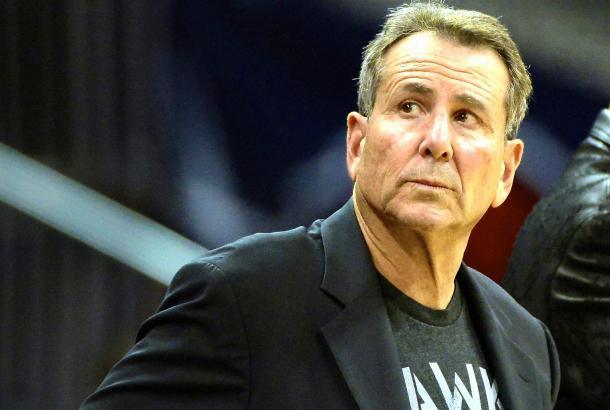Hawks Owner Stumbles While Seeking White Fans
By JESSE WASHINGTON
AP National Writer
September 9, 2014
It seems benign at first: Atlanta Hawks owner Bruce Levenson wanted to sell more tickets to white people.
The problem arose with Levenson’s email describing his solution: Decrease the percentage of black people at his games. The email drew widespread condemnation, and led to Levenson’s decision to sell his controlling share of the pro basketball team.
Is it wrong to seek out white customers? Can it be done in a way that’s not racist? If there is truth in Levenson’s belief that many white people are uncomfortable in majority black environments, what’s the right way to attract those white customers?
Richard Lapchick, founder and director of the Institute for Diversity and Ethics in Sport, has worked for decades toward getting more black or Latino people involved in sports, from buying tickets to running teams.
Lapchick found some parts of the email stereotypical, such as the implication that black fathers are not involved in their sons’ lives or black fans can’t afford to buy jerseys, food or expensive tickets.
He acknowledged that “there are white people who would be less comfortable in an environment where the people are overwhelmingly black. I think America has developed this fear imagery of what possibly could happen to them” in those situations.
But as far as selling more tickets to white fans: “Done right, it doesn’t seem like a bad thing at all,” Lapchick said. “It’s what companies do.”
Kareem Abdul-Jabbar, the legendary ex-player and scholar of race in America, said Levenson’s remarks were not racist: “Levenson is a businessman asking reasonable questions about how to put customers in seats,” he wrote in a Time magazine column.
But the problem was Levenson’s approach to reaching those customers, said Derek Arnold, a Villanova University communications professor who studies business scandals.
Levenson said in his email, “My theory is that the black crowd scared away the whites and there are simply not enough affluent black fans to build a significant season ticket base.”
That seemed to “blame” black fans while refusing to address the false stereotypes that make some white fans uncomfortable, Arnold said. And some of Levenson’s proposed solutions _ fewer black cheerleaders; fewer black couples on the arena “kiss camera” _ could be considered discriminatory against black people, he said.
Others saw Levenson, consciously or not, trying to make money from a racist status quo that feeds irrational fears of a stadium full of black people.
“It shows the undercurrent of the tacit approval of institutional racism that people can’t even identify in themselves,” said Dan Lebowitz, executive director of the Center for the Study of Sport and Society at Northeastern University.
“What’s wrong with us that we put commodity before the benefit of the human condition?” Lebowitz asked. “How come we always think about individual profit over collective good?”
White people have often flocked to products that were first popularized by African-Americans, such as jazz, Air Jordan sneakers and rap music.
“The same, I believe, can be done within any city with any sport,” Arnold said. “A successful team that embodies the spirit of that city would go a long way towards attracting all varieties of people.”
The Hawks are not a successful team.
The closest they have come to a championship is the Eastern Conference semifinals. Levenson’s group bought the team in 2004; the Hawks missed the playoffs from 2001 to 2007. The past three seasons, they lost in the first round. They haven’t had an exciting, marquee player since the departure 20 years ago of Dominique “The Human Highlight Film” Wilkins. The team lost an average of $7.3 million in each of the past five years, according to Forbes.
The entire NBA, meanwhile, has long faced questions about selling what has been considered a “black sport” to white fans.
After the league signed its first black player in 1950, for years there was an unofficial limit to the number of black players on each team. Such quotas evaporated by the 1980s, when billowing Afros filled NBA courts, but media coverage of multiple cocaine scandals soured the public. As the 1990s arrived, the league was carried to new heights by the great, interracial rivalry of Larry Bird and Magic Johnson, then taken global on the back of the unparalleled Michael Jordan.
This was the history behind Levenson’s email, in which he looked at other arenas and saw a far lower percentage of black fans. Yet he never mentions that Atlanta has long been considered the “black mecca” of America, attracting many prosperous black people and a thriving black business class.
“As a leader, I think you need to embrace and appreciate who your customer base is,” said Dr. Paul Marciano, a psychologist, organizational expert and author of the workplace culture book “Carrots and Sticks Don’t Work.”
When Levenson asked how to attract more white customers, “I think he asked the wrong question,” Marciano said.
“How to do we continue to appeal to our base customer, while welcoming others with higher socioeconomic status—not white, but higher socioeconomic customers? That’s the right question,” he said.
Levenson hinted as much when he issued a statement of apology for his email.
“We all may have subtle biases and preconceptions when it comes to race, but my role as a leader is to challenge them, not to validate or accommodate those who might hold them," Levenson said.
Such a challenge could have come from Levenson mixing with the average black fans he thought were scaring away white customers, Marciano said.
“Sit next to them, get to know them, thank them for coming to the game, invite some of them up to a box,” he suggested. “From a business perspective, if that was what was seen, I think it would improve their attendance.”
“They would see,” Marciano said, “that the owner is not afraid of them.”
